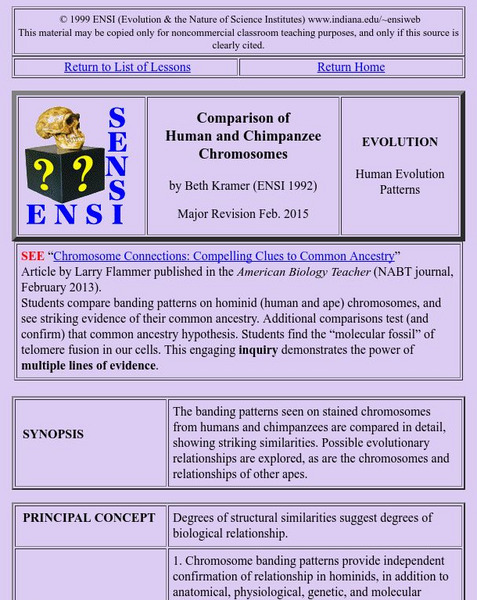Hi, what do you want to do?
Mary Pope Osborne, Classroom Adventures Program
Mummies in the Morning Egyptian pyramids, hieroglyphics
Visit the Magic Treehouse and take your class on a trip through time with a reading of the children's book Mummies in the Morning. Using the story to spark an investigation into Egyptian culture, this literature unit engages...
ARKive
Darwin and Natural Selection
A presentation on Darwin's theory of evolution and natural selection could be a good addition to your biology class. It provides general information about how animals adapt to their surroundings, as well as how organisms create more...
Curated OER
Life Cycle of Trees
Turn your students into young tree-tectives with this fun science investigation into the life of trees. To begin, a class volunteer gets dressed up in a tree costume as the different parts of trees are introduced. Then, the class...
Mathematics Vision Project
Module 3: Arithmetic and Geometric Sequences
Natural human interest in patterns and algebraic study of function notation are linked in this introductory unit on the properties of sequences. Once presented with a pattern or situation, the class works through how to justify...
Core Knowledge Foundation
A Time for All Seasons - Spring
Celebrate the arrival of spring with this fun primary grade science unit. Engaging young scientists with a variety of hands-on activities and inquiry-based investigations, these lessons are a great way to teach children about...
Howard Hughes Medical Institute
Understanding Variation
Does where we live influence how our bodies express genetic traits? Explore variation in human skin color with an activity that incorporate video and hands-on learning. Individuals model the relationship between phenotypes and genotypes,...
American Museum of Natural History
DNA Detective
Match up the DNA code. Pupils read the website from the American Museum of Natural History about how DNA can determine whether a skin is from a particular type of reptile. Using the same technique, learners match up products with the...
Science Matters
Ring of Fire
Over a period of 35 years, earthquakes and volcanoes combined only accounted for 1.5 percent of the deaths from natural disasters in the United States. The 15th instructional activity in a 20-part series connects the locations of...
Chicago Botanic Garden
Causes and Effects of Climate Change
Wrap-up a unit on global climate change with a instructional activity that examines the causes and effects of climate change. Learners fill out a chart that represents what they think causes climate change—natural and human-based—and...
US Environmental Protection Agency
Weather and Climate: What's the Difference?
Future weather forecasters collect daily temperatures over a period of time. Afterward, they compare their data with monthly averages, as researched on national weather websites, in order to grasp the difference between weather and...
Berkshire Museum
Camouflage!: Collecting Data and Concealing Color
Help young scholars see the important role camouflage plays in the survival of animals with a fun science lesson. Starting with an outdoor activity, children take on the role of hungry birds as they search for worms represented by...
Chicago Botanic Garden
Recognizing Change (Observation vs. Inference)
What is the difference between making inferences and making observations? Young climatologists refer to a PowerPoint to make observations on each slide. They record their observations in a provided worksheet before drawing a...
EngageNY
Tides, Sound Waves, and Stock Markets
Help pupils see the world through the eyes of a mathematician. As they examine tide patterns, sound waves, and stock market patterns using trigonometric functions, learners create scatter plots and write best-fit functions.
Orange County Water Atlas
Location, Location, Location…
Young geographers discover not only how to read and recognize coordinates on a map, but also gain a deeper understanding of latitude and longitude and how climate changes can vary significantly across latitudes.
US Geological Survey
U.s. Geological Survey: Groundwater Information by Topic
A massive amount of information about groundwater. Topics covered include groundwater basics, humans and groundwater, groundwater quality, and its place in the water cycle. Includes true-and-false quiz and a Q&A section, as well as a...
Indiana University
Ensi: Comparison of Human: Chimpanzee Chromosomes Lesson
This is a great lesson plan that combines Karoytypes and evolution. Students will recognize that the chromosomes of chimpanzees and humans are remarkably similar, then correlate that to their evolutionary relationship.




















